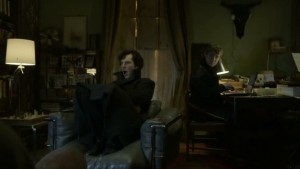Sherlock – “The Great Game”
“Bet you never saw this coming.”
Talking about the whole episode seems a little bit pointless, but since the entire episode (and of course the other episodes) were building to this. Indeed, as I told Ms. Monster of Television (girlfriend, not wife), deadlines are a key way to create suspense, and they do a terrific job in this episode. But they also constantly remind you that you’re so close yet so far to finding out who Moriarty is. And that can be infuriating.
Solving the bombing cases was a pretty obvious ploy, a distraction (as Ms. Monster of Television figured out before I did), but the ploy makes for both an exciting and tiring episode, and with all that that entails. Countdowns and ticking clocks make for easy suspense (we’ve been using them for how long now?), and you pile it on with multiple micro-cases that allows us one last glimpse into how smart Sherlock is, the episode chugs along at a very pleasant pace (unlike “The Blind Banker”), but the deadlines and bombs and the cases make the episode feel a bit overstuffed (there’s clearly no pleasing me, is there?).
But, really, we need to talk about Jim Moriarty, consultant criminal. Even after watching the last scene a couple of times, I’m still on the fence about Andrew Scott’s Moriarty. Scott benefits, like all who have portrayed Moriarty before him, from the fact that Moriarty actually only appeared in two Holmes stories, so there’s no Doyle version that he really have to live up to and not get blasted by the fans. The bulk of what Moriarty has to live up to his intellect, and that largely falls to the writers to make convincing.
Moriarty, in the stories, was the Napoleon of Crime, a criminal mastermind who was most likely was the leader of an organized crime ring (of sorts). Holmes worked tirelessly to break it, refusing other cases since he detected a pattern in the crimes. As with other characters in this series, Moriarty works more or less in this capacity, though more so as someone who arranges for crimes to occur than a direct mastermind. This reworking of Moriarty, like Watson’s slight adjustments, remains in keeping with the original flavor of the character while being a modern version of outsourcing. In this regard, the treatment of Moriarty is like a complete success.
But it’s the performance that I just have difficulty with. The pitchy accent, gay camp and narm-heavy delivery had me wondering if Russel T. Davies actually conceptualized the character, or if Moffat, Gatiss, and Scott got together and said, “Why don’t we play this like John Simms’ Master, but cranked to 11?” The character also plays a little too much into the foe yay for me, which ends up feeling more like fanfiction bait (as well as an acknowledgement that fanfiction about Holmes and Moriarty has been, and will continue to be, written) than actual character definition. I’m sure the character will be lapped up by fans and academics alike because of this, but I’m not sure how much of it I can take.
All that being said, once you cut through the clutter (and that’s kind of how I feel about it), the script and performances allow for the “We’re not so different, you and I” stuff to still work, which, for me anyway, is what really matters. Holmes and Moriarty are two sides of the same coin, and this comes through not only in their chosen careers (they’re both still consultants), but ultimately in their personalities, their depiction of this type of manic brilliance. They know each other better than anyone else ever can, and there’s a grudging respect in that (though I suspect Sherlock is disappointed in Moriarty’s resort to far too many snipers in a pool move).
I can dislike the actual performance even if I appreciate its intention, and I’m pretty much okay with that stance. So long as Moriarty is kept to a minimum (and with a show that only does 3 episodes a series, this should only be once a series), I will be fine with Moriarty’s role in this Sherlock.
- August 17, 2010
- Noel
- Episode Review
- Season Finale, Sherlock


